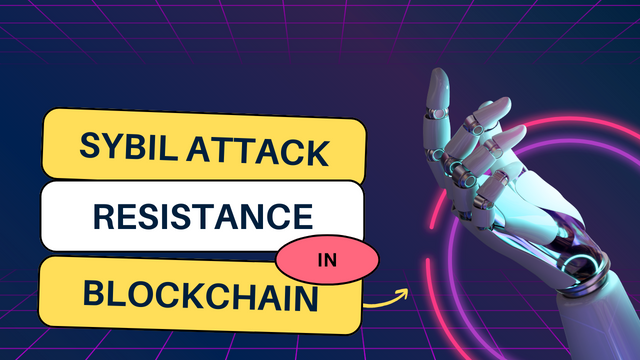Blockchain technology relies on trustless systems for security and reliability through its decentralized architecture. Among the notable challenges it faces is the Sybil attack which threatens the network integrity by having multiple false identities created by malevolent actors. In this post I will discuss what is meant by Sybil resistance in a blockchain, why it matters and some methods used to prevent this kind of attack.

Sybil Attacks Explained
During a Sybil attack is that an individual or organization creates many different accounts or nodes to gain control over a network. These false identities can be utilized for vote manipulation, disrupting consensus algorithms among other malicious acts.
Why Should We Care About Sybil Resistance?
The reason behind maintaining sybil resistance lies in keeping decentralization alive while ensuring security around blockchain systems. If we are not well protected against these attacks, bad players could easily destroy faith within such a system, compromise mechanisms used for agreement between parties and take advantage of any vulnerability available to themselves.
Methods Of Achieving Sybil Resistance

On proof of work based blockchains miners are required to solve complex computational puzzles which validate transactions to make the network secure. The expense as well as duration taken to execute PoW can be considered resistance against Sybil attacks.
According to proof of stake validators are chosen by taking into account how much cryptocurrency they own and are ready to put up as collateral. For one to have control, he or she has to accumulate a large number of assets thereby making it economically unviable for sybil attackers.
In the Proof of Burn participants destroy (burn) some amount of cryptocurrency in order access network resources or privileges. It would be too expensive for sybil attackers who would have to bear financial losses while creating fake identities which makes the attack economically infeasible.
Some blockchain projects integrate identity verification measures like Know Your Customer (KYC) requirements so that they can prevent Sybil attacks. However, such an approach might compromise user privacy and decentralization.
Challenges
Although these mechanisms increase network security against sybil attacks they also bring about challenges. These are given below:
- Scalability: There are some scalability limitations in various sybil resistance mechanisms. PoW consumes a lot of computational resources thus restricting the scalability of blockchain networks.
- Dangers of Centralization: PoS can foster centralization among rich actors, who might possess more cryptocurrencies that they can stake.
- User Friendly: Users who care about privacy and anonymity may be put off by having to prove their identity, which could lead to lower network participation.
Future Trends about Sybil Attacks
Hybrid Approaches: In the future, blockchain projects might think about hybrid Sybil resistance mechanisms that combine strengths of different methods while neutralizing their weaknesses.
Layer 2 Solutions: Layer 2 protocols and sidechains as off chain scaling solutions could solve scalability issues tied to Sybil resistant measures.
Research and Innovation: Novel Sybil resistance mechanisms should be designed through further research and innovation that balances security, decentralization and usability.
Conclusion
One can conclude that without Sybil resistance a blockchain cannot be decentralized nor secure. Blockchain is vulnerable to attacks and Sybil attack is one of them. Trust in decentralized systems will increase if only strong measures are taken against such attacks while also dealing with its challenges using appropriate ways.
X Permotion
https://twitter.com/shabbir_saghar/status/1786800208283660562?t=0762QMFxPYl2fD7We058ZA&s=19
Downvoting a post can decrease pending rewards and make it less visible. Common reasons:
Submit
Upvoted! Thank you for supporting witness @jswit.
Downvoting a post can decrease pending rewards and make it less visible. Common reasons:
Submit
Note:- ✅
Regards,
@jueco
Downvoting a post can decrease pending rewards and make it less visible. Common reasons:
Submit